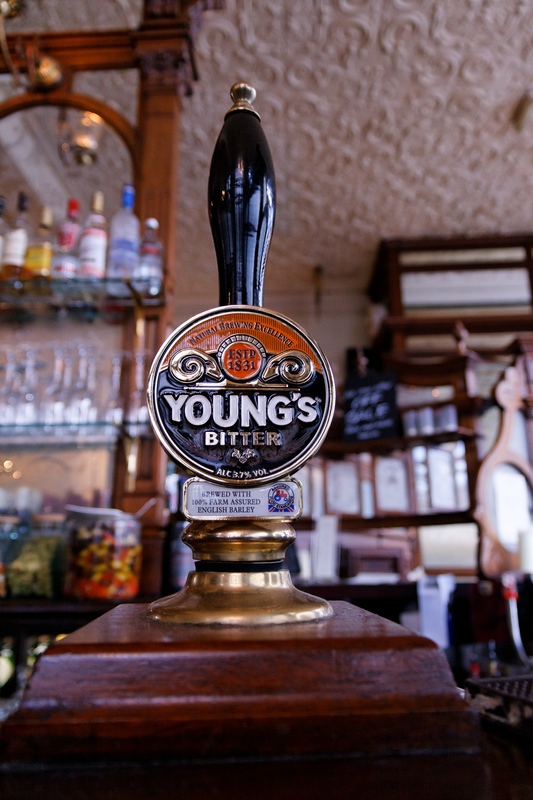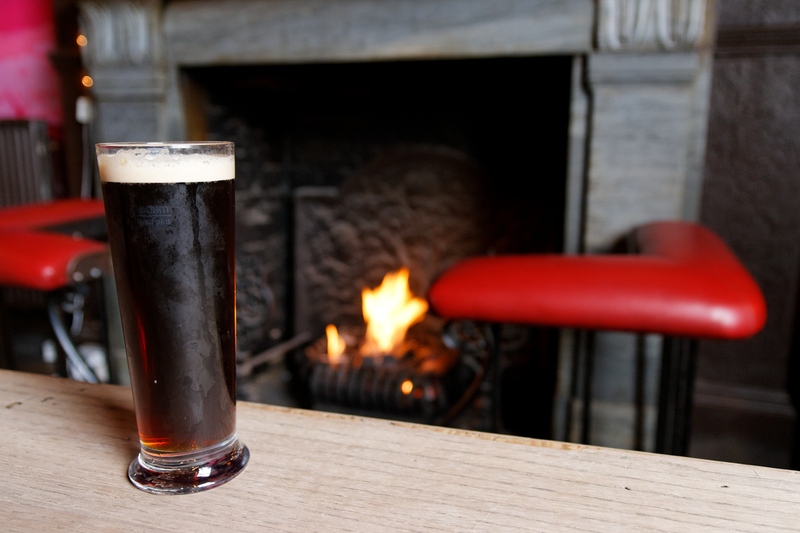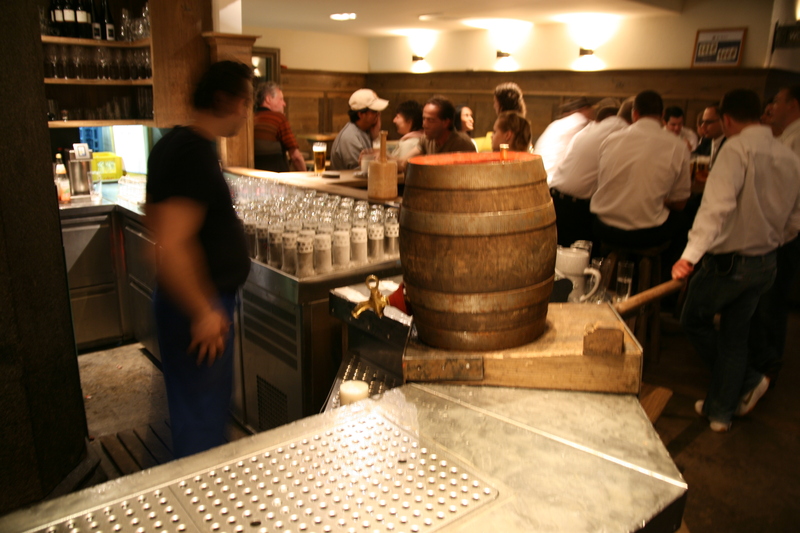Cask beer

Cask beer engine, The Prince Alfred, London |
The summer after finishing high school a friend and I set out on an interrail trip through Europe. In England, one of the things we wanted to experience was a proper English beer. So we ordered a Guinness. This was a mistake on many different levels, but I'll limit myself to three here. First, Guinness is of course Irish, and not English. Secondly, we could have had it just about anywhere in Norway. But perhaps the worst mistake was that what's most unique about British beer culture is the cask method of serving beer draft. Guinness, however, even in England, is served from keg, like draft beers in the rest of the world.
People will tell you that the English like their beer flat (meaning with no CO2) and at room temperature, and this is not an unreasonable description of beer served from cask. When beer is served from keg, pressurized CO2 is used to push the beer out of the keg and into your glass. This gives the beer the fizzy sparkle that we're all familiar with. Unfortunately, the fizz in your mouth also serves to obscure the taste of the beer.
A cask, on the other hand, is not pressurized, and is open to the air around the cask. This means that much of the CO2 escapes, and the result is beer that feels much smoother and milder in the mouth, and where the flavour and aroma are more prominent. The cask is often kept in a cellar below the bar, which means that the beer will typically be served at cellar temperature. Tasting the same beer from cask and from bottle can be a quite startling experience, because the difference can be so big that it appears not to be the same beer at all. (Be aware, though, that in the UK the recipes for a cask ale and a bottled ale of the same name are often different. Even the alcohol strength can be different.) I've found the comparison to be usually very much in favour of the cask version, with some exceptions.
I have to admit that the first times I tried cask ale I wasn't very impressed. I was put off by the unfamiliar mouthfeel (the flatness, mostly), and wasn't really able to appreciate the depth of the flavour, and felt that after the first two-three beers they all tasted the same. It was only after repeated exposures that I started really appreciating beer served in this way. Now I very much prefer cask beer to beer served any other way. When I can find it, that is.

Cask ale, The Bridge House, London |
Unfortunately, draft beer around the world is nearly universally dispensed from keg. The reason is that cask beer is harder to work with. Since it's exposed to the air it generally goes bad within 3-7 days, and so high turnover is needed. It also requires a bit of cellarmanship to treat it right and prepare it for dispensing. And, finally, the barkeep has to use a handpump to pull the beer from the cellar. Keg beer, on the other hand, can be delivered by a tank car through a hose to a tank in the basement, and poured into a glass at the flick of a switch. No particular skills are needed from the staff, which is a great advantage in the pub trade, which has very high turnover.
Historically, all draft beer was served from cask, in some form. In the 20th century, however, keg replaced cask pretty much everywhere. Except, that is, in the United Kingdom, where the Campaign for Real Ale (CAMRA) managed to save it in the 1970s. This doesn't mean that draft beer in the UK is cask, only that a reasonable number of pubs there have one cask ale or more. Industrial beers like Stella, Guinness, Foster's, and so on are always served from keg, even in the UK. It's only the micros and regionals which produce cask ale. In the pub, you can recognize cask beers because of the characteristic beer engines they are pulled from, such as the one in the photo at the top right in this posting.
Unfortunately, when you do get beer from cask there is a tendency in British pubs to fill the glass to the rim, leaving some of it to slop over. This gives you a wet glass, beer stains on the table, and so on. It also leaves no room for the head. But worst of all, in my opinion, is that the aroma cannot gather inside the glass, instead dispersing in the air around the glass. The result is that you are robbed of some of the flavour of the beer.
Cask beer can also be found outside of the UK, but is definitely rare. Fuller's exports casks to a few places in Finland, the Bishop's Arms pubs in Sweden, and some pubs in Denmark also have it. In Norway 3-4 pubs occasionally serve Nøgne Ø beers from cask. I've also found it in Japan in a couple of places (notably Popeye), and obviously it must exist in the US, too.

Wooden cask, Der Pschorr, München, Germany |
In Germany the cask tradition is actually not completely dead, but different from in the UK. It's generally only a few brewpubs and brewery taps which serve cask beer. And, this being Germany, they tend to serve cask lager, rather than ale. When you do find it, it's typically in the form of a wooden cask (holzfaß) placed on the bar counter, with no elaborate beer engine for pumping the beer, because instead they use a simple tap that exploits the force of gravity to pour the beer. The photo above shows one example.
I would assume that it's also possible to find cask beer in the Czech Republic, but must confess that I couldn't really tell you where. As for Belgium, I don't really know. It would be strange if it wasn't possible to find cask beer there, but at the same time I can't remember ever seeing it or hearing about it.
In any case, if you ever visit the UK, this is one of the things you must make sure to try. Look for CAMRA's cask marque by the entrance to the pub. That's a sign not just that they have cask ale, but also that it's in good condition.
Similar posts
Pub-walking in London
It's odd that the pub should in one sense be the ultimate English tourist attraction, since all countries have their own bars and cafés, but somehow the English pub has become part of international culture
Read | 2009-02-10 12:34
How to find good pubs in London
It's hard to find the really good pubs in most places in the world of any size, but London presents special challenges, for a number of reasons
Read | 2009-10-18 13:26
Comments
The Beer Nut - 2009-01-25 10:17:11
In fairness to your teenage self, the Guinness probably was English -- brewed at the Park Royal brewery in London. And Guinness has always been a British company, really.
A cask can be made to last longer than a few days by using a cask breather which keeps the oxygen out as it empties. CAMRA frown on them, however, for no real reason I can see.
And for cask beer in Belgium you can try Beer Circus in Brussels where they have gravity-served Girardin lambic, which is gorgeous.
Damien - 2009-01-25 20:26:00
Great informative introductory post to cask conditioned beer. I appreciate the effort you put in!
Arnoud Haak - 2009-01-26 08:56:45
I'm not going to argue with you about that it's harder to serve a beer from a cask in comparison to a keg. But I've worked in a bar for a couple of years and saw enough people who just could not get a decent beer from a keg. That also requirers somekind of skill I suppose.
Justin - 2009-01-29 19:55:34
Nothing tastes better than cask beers. Generally, they also get another stage of hopping. So they aroma and taste of the hops are more pronounced. I also like the smoother mouthfeel and warmer temperature. High-grav brews like barleywines are crazy-good out of a cask. I'm luck to have a place near me that always has a cask flowing.
Spile - 2009-03-13 09:38:42
" Look for CAMRA's cask marque by the entrance " CAMRA and Cask Marque are completely separate organisations. CAMRA recommended pubs can be found in the CAMRA Good Beer Guide. These pubs have a "We're in the CAMRA Good Beer Guide" sticker indicating the year of entry. Cask Marque use their own promotional materials.
ChadH - 2009-05-15 12:39:26
Very informative. Although I don't currently have any establishments nearby that serve cask ale, I do go to Europe on occasion. My next trip I'll be looking for a pub serving ale in this manner. Thanks
dimitar - 2015-06-18 02:58:59
Like the post very much. But things are changing nowadays. There is an English pub in Sofia, Bulgaria dealing with Fuller's ESB and London Pride. But the problem is the export interest in the UK breweries and retailers which are focused on the domestic market. So the export opportunities are almost minimum.